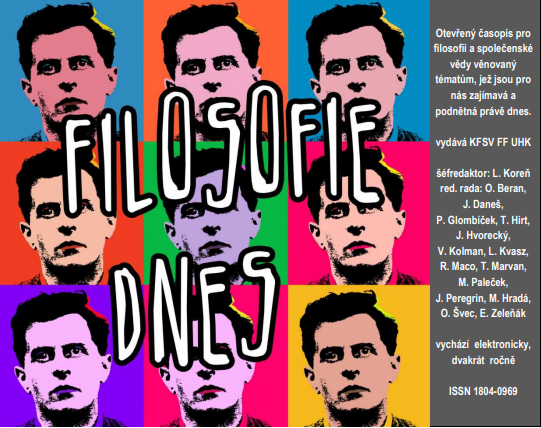Pojem komplexity v díle Teilharda de Chardin
DOI:
https://doi.org/10.26806/fd.v8i1.215Keywords:
Teilhard de Chardin, komplexita, evoluceAbstract
Záměrem textu je vyložit pojem komplexity v křesťanské evoluční teorii Teilharda de Chardin. V úvodu je nastíněna Teilhardova metoda pracující s hodnotovým aspektem a rozlišující tři kvality bytí (jednotu, různorodost a intenzitu vztahů), které v evoluci narůstají. Hlavní část článku tvoří pokus o nalezení kritéria komplexity různých celků a organismů na základě těchto tří kvalitativních aspektů. V závěru textu je načrtnuto hlavní teologické téma Teilhardovy teorie: Bohem stanoveným cílem evoluce založené na sebeorganizaci je umožnit kreativitu a svobodu na každé z evolučních rovin, a to v míře podle dosaženého stupně komplexity. Na úrovni noosféry dosahuje svoboda své plnosti a starost o pokračování evoluce, včetně nalezení vlastního jedinečného příspěvku do komplexních celků lidských společenství, se stává vlastním úkolem člověka jako spolupracovníka na tvoření světa.
The paper presents the concept of complexity in the Christian evolutionary theory of Teilhard de Chardin. First, the Teilhard’s method is presented, dealing with values and distinguishing three qualities of being (unity, diversity and intensity of relationships) which increase in the evolution. Author then attempts to find criteria of complexity of different systems and living entities, based on the three mentioned qualities. Finally, the main theological topic of Teilhard’s theory is sketched: Evolution is based on self-organization and its goal (determined by God) is to enable creativity and freedom at each evolutionary level according to the level of attained complexity. At the level of noosphere, freedom reaches its fullness; the concern of human being as a co-worker on creation of the world with advancing evolution becomes his main task, including the search for one’s own unique contribution to the complexity of the human systems.
Downloads
Published
Issue
Section
License
Authors who publish in this journal agree that:
1. Authors retain copyright and guarantee the journal the right of first publishing. All published articles are licensed under the Creative Commons Attribution license, which allows others to share this work under condition that its author and first publishing in this journal was acknowledged.
2. Authors may enter into other agreements for non-exclusive dissemination of work in the version in which it was published in the journal (for example, publishing it in a book), but they have to acknowledge its first publication in this journal.
3. Authors are allowed and encouraged to make their work available online (for example, on their websites) as such a practice may lead to productive exchanges of views as well as earlier and higher citations of published work (See The effect of open access).


